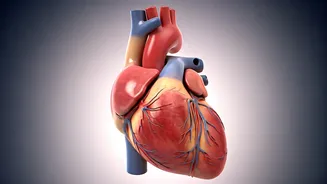Walk After Meals
Incorporating a post-meal walk is a simple yet potent method to bolster heart health. Experts recommend a brief stroll following each meal. This seemingly
small action can have a big impact on blood sugar levels, helping to stabilize them. Stable blood sugar is critical because fluctuations can contribute to artery plaque buildup and potentially elevate heart attack risk. By making this walk a regular part of your routine, you can actively reduce the strain on your cardiovascular system and promote overall well-being. This gentle activity aids in improving blood circulation and metabolic function, supporting a healthy heart in the long run. Walking after meals is a practical, easy-to-implement strategy that integrates smoothly into daily life, offering a proactive approach to heart health management. It underscores the importance of consistent, everyday actions in maintaining a healthy cardiovascular system.
Track Key Biomarkers
Monitoring specific biomarkers provides valuable insights into your heart health status and enables proactive intervention. This involves regular check-ups to track essential indicators such as cholesterol levels, blood pressure, and blood sugar. Understanding your biomarker readings empowers you to make informed decisions about your lifestyle and diet. For example, high LDL cholesterol or elevated blood pressure signals an increased risk of heart disease, prompting you to modify your diet or increase physical activity. Tracking these biomarkers helps you to assess how well your heart is functioning and identify areas needing improvement. Regular check-ups with your healthcare provider provide you with crucial data, allowing you to tailor your approach to maintain optimal cardiovascular function and reduce your chances of experiencing a heart attack.
Avoid Harmful Plastics
Minimizing exposure to harmful plastics plays a crucial role in maintaining heart health by reducing the risk of exposure to potentially damaging chemicals. Certain plastics contain compounds that can leach into food and beverages, which may lead to adverse health effects. Switching to glass, stainless steel, or BPA-free plastic alternatives can limit your exposure. Avoid microwaving food in plastic containers and opting for safer storage solutions is a simple yet effective way to protect yourself. Reducing plastic use also supports environmental health, contributing to a broader context of sustainable living. Making conscious choices about plastic usage not only benefits your health but also reflects a commitment to protecting the environment. This helps minimize exposure to potentially harmful substances that could negatively impact cardiovascular function.
Prioritize Omega-3 Fatty Acids
Increasing your intake of omega-3 fatty acids is beneficial for heart health and cardiovascular function. These essential fatty acids possess anti-inflammatory properties, promoting overall heart health. Omega-3s can reduce triglycerides, lower blood pressure, and decrease the risk of blood clots. Including foods rich in omega-3s, such as fatty fish like salmon, flaxseeds, chia seeds, and walnuts, supports healthy heart function. Consider incorporating these foods into your diet regularly, aiming for a balance that meets your nutritional needs. Dietary adjustments like these offer an effective and accessible approach to enhance your heart health. Prioritizing omega-3 fatty acids is an easy yet impactful method to shield your heart and maintain long-term well-being.
Protect Your Sleep
Ensuring adequate and restful sleep is critical for heart health and overall well-being. Sleep deprivation can lead to increased blood pressure, inflammation, and stress hormone levels, all of which contribute to elevated heart attack risk. Aim for 7-9 hours of quality sleep each night to allow your body to recover and function optimally. Create a relaxing bedtime routine to improve sleep quality. This could involve avoiding screens before bed, practicing relaxation techniques, or creating a comfortable sleep environment. Prioritizing sleep is not only beneficial for your heart but also supports your immune system, cognitive function, and emotional health. Good sleep is a vital component of a holistic approach to maintaining a healthy heart and overall vitality.















